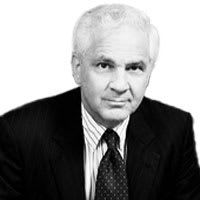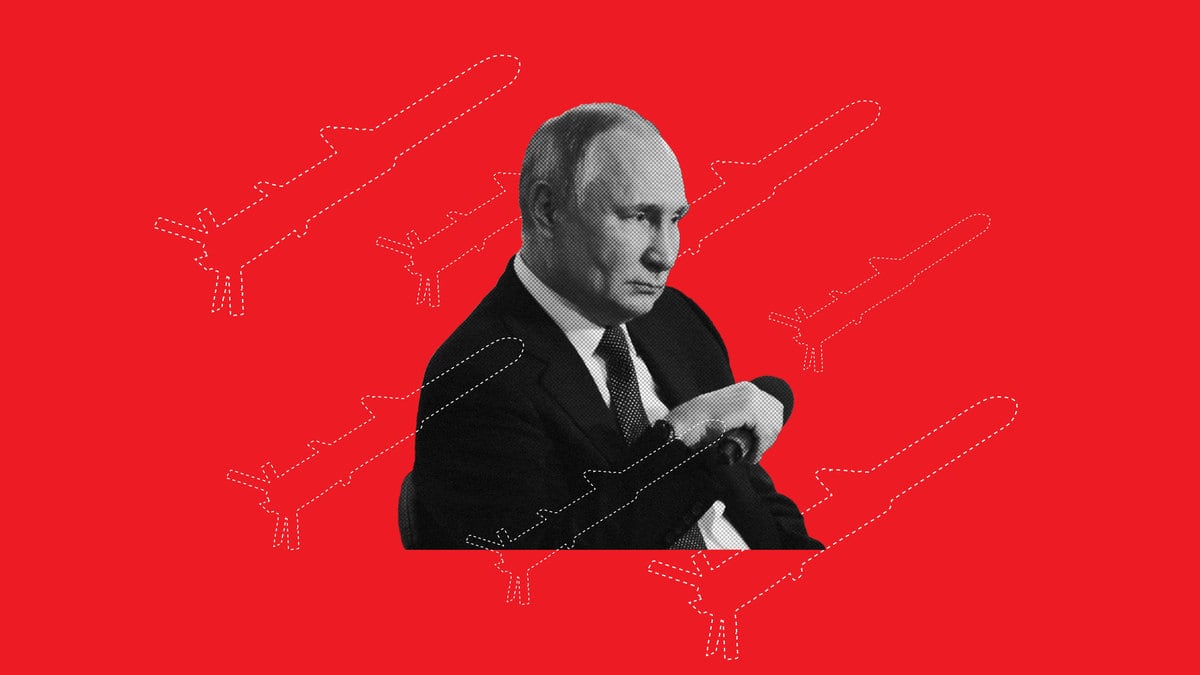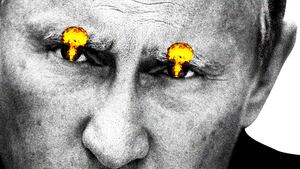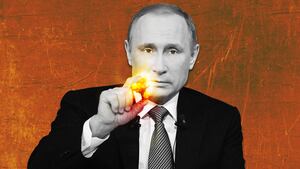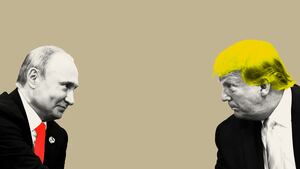Russian President Vladimir Putin has loudly and repeatedly warned that he could use nuclear weapons in his war on Ukraine. But Putin has now suffered three major strategic defeats, losing the battles for Kyiv, Kharkiv, and Kherson. And Ukrainian forces continue to attack his military in the provinces he illegally annexed, and have even launched long-range attacks deep within Russia proper.
So why hasn’t he used nuclear weapons to reverse his defeats?
On the day he invaded Ukraine, Putin warned)" href="https://urldefense.com/v3/__https://www.wired.com/story/putin-nuclear-threat-ukraine-sanctions-history/__;!!LsXw!Qjq7AsTctYdI8vdjs5C6YRzcGzzV90Ur55hsT1SCoStxgZxumSa5K2sSzQLWVfboI7H4ci8vAxDgToueBDTLIoAmPKXz$">warned: “No matter who tries to stand in our way… they must know that Russia will respond immediately, and the consequences will be such as you have never seen in your entire history.”
For months, these threats tumbled from Russian officials and media spokespersons almost daily. We had to take them seriously.
Putin has the means, method, and motive to implement his threats. He has almost 6,000 nuclear weapons in his arsenal, at least 1,000 of which could be quickly fitted to the missiles he is currently using to pummel Ukraine’s cities. Some of those weapons are stored at Engels Air Force Base, which Ukraine has twice hit with drone attacks, and could be mounted on the bombers that launch from there.
Russian military doctrine details)" href="https://urldefense.com/v3/__https://www.washingtonpost.com/opinions/2022/09/26/putin-nuclear-threat-bluff-us-biden-response/__;!!LsXw!Qjq7AsTctYdI8vdjs5C6YRzcGzzV90Ur55hsT1SCoStxgZxumSa5K2sSzQLWVfboI7H4ci8vAxDgToueBDTLIsekjViy$">details multiple scenarios for using those weapons first in a conventional battle. And Putin is motivated. Losing the war would be a grave threat to maintaining his grip on power.
Though fears of Putin’s nuclear weapons use were justified in the first, highly uncertain months of the war, any analysis has to adjust to events. Evidence gleaned over the past five months indicates the risks are decreasing.
Here’s why.

Ukrainian servicemen prepare to fire a BM-21 Grad multiple launch rocket system towards Russian positions on a frontline near the town of Marinka, amid Russia's attack on Ukraine, in Donetsk region, February 7, 2023.
Reuters/Marko DjuricaFirst, Putin is losing slowly. There is no moment in this war where Putin was faced with a decision to go nuclear or go home. Ukrainian forces are advancing, but they do so by tens of kilometers, not hundreds. Russian forces are being ground down, but not routed. There could be a sudden collapse, but a slow retreat back to Russia’s borders seems more likely. And Putin still believes he can win. He is preparing for a new offensive now.
So while this is the closest the world has come to the intentional use of nuclear weapons since the Cuban Missile Crisis, it is not as intense as that showdown was over 13 terrifying days in October 1962. It is very hard, even for Putin, to justify exploding nuclear weapons over a slow, grinding defeat. Like a frog who sits in a pot of water heating slowly, Putin doesn’t feel any point at which he must make a nuclear leap.
Secondly, President Joe Biden has carefully threaded the nuclear needle. His administration has supplied Ukraine with the weapons, training, and intelligence it needs to blunt the invasion, but has not given it weapons with ranges long enough to reach deep into Russian territory.
U.S. officials have carefully—perhaps too carefully—calibrated arms deliveries, ratcheting up the quality and quantity of aid. Nor have senior officials made the mistake of responding to Putin’s nuclear threats with their own nuclear braggadocio. They are firm, but do not directly threaten Putin. Instead of “fire and fury” and claims about whose nuclear button is bigger, U.S. officials continue to search for diplomatic ways)" href="https://urldefense.com/v3/__https://www.cnn.com/2022/11/07/politics/us-ukraine-diplomacy/index.html__;!!LsXw!Qjq7AsTctYdI8vdjs5C6YRzcGzzV90Ur55hsT1SCoStxgZxumSa5K2sSzQLWVfboI7H4ci8vAxDgToueBDTLIvRm2BzS$">diplomatic ways to end the war. In short, they have engaged in smart escalation control.
It has worked. If Putin’s threats were intended to deter the West from aiding Ukraine, the administration’s own deterrence tactics over the past six months have made a difference.
Sen. Ed Markey (D-MA) told a Harvard forum this January that U.S. officials have done the three things necessary)" href="https://urldefense.com/v3/__https://www.belfercenter.org/event/nuclear-politics-senator-ed-markey__;!!LsXw!Qjq7AsTctYdI8vdjs5C6YRzcGzzV90Ur55hsT1SCoStxgZxumSa5K2sSzQLWVfboI7H4ci8vAxDgToueBDTLIjBPNQnZ$">the three things necessary to prevent the use of nuclear weapons in Ukraine: They have made the case directly to Russia that crossing the nuclear line would result)" href="https://urldefense.com/v3/__https://www.washingtonpost.com/video/politics/sullivan-catastrophic-consequences-for-russia-nuclear-use/2022/09/25/6509ce6a-6ebb-4946-b1f9-d14f97696a28_video.html?nid=menu_nav_v__;!!LsXw!Qjq7AsTctYdI8vdjs5C6YRzcGzzV90Ur55hsT1SCoStxgZxumSa5K2sSzQLWVfboI7H4ci8vAxDgToueBDTLImIs_AHM$">would result in catastrophic consequences, including multiple economic, diplomatic, cyber, and conventional military responses)" href="https://urldefense.com/v3/__https://www.washingtonpost.com/opinions/2022/09/26/putin-nuclear-threat-bluff-us-biden-response/__;!!LsXw!Qjq7AsTctYdI8vdjs5C6YRzcGzzV90Ur55hsT1SCoStxgZxumSa5K2sSzQLWVfboI7H4ci8vAxDgToueBDTLIsekjViy$">responses from the U.S. and its allies; they have built an international coalition that lets Russia know that it will pay a generational price if they start a nuclear war; and “they have made clear to Putin that we will not allow him to destroy the democracy of Ukraine.”
Putin must know that joint global economic and diplomatic measures alone could isolate and cripple Russia unlike anything done to a nation is history. In extreme, U.S. and NATO forces could pulverize Russian forces with devastating conventional military attacks. As French President Emmanuel Macron has made clear)" href="https://urldefense.com/v3/__https://www.thenationalnews.com/world/europe/2022/10/13/france-wont-retaliate-with-nuclear-weapons-if-russia-uses-them-in-ukraine/__;!!LsXw!Qjq7AsTctYdI8vdjs5C6YRzcGzzV90Ur55hsT1SCoStxgZxumSa5K2sSzQLWVfboI7H4ci8vAxDgToueBDTLIg3c3KDO$">has made clear, with these options there is no military need to respond to a Russian nuclear attack with a nuclear attack of its own.
It is not just the West who opposes any Russian use of nuclear weapons. Putin’s closest allies, China and India, have explicitly warned him not to cross the nuclear line.

U.S. President Joe Biden welcomes Ukraine's President Volodymyr Zelenskiy to the White House in Washington, U.S., December 21, 2022.
Reuters/Kevin LamarqueChinese President Xi Jinping said)" href="https://urldefense.com/v3/__https://www.politico.eu/article/china-xi-jinping-warns-vladimir-putin-not-to-use-nuclear-arms-in-ukraine-olaf-scholz-germany-peace-talks/__;!!LsXw!Qjq7AsTctYdI8vdjs5C6YRzcGzzV90Ur55hsT1SCoStxgZxumSa5K2sSzQLWVfboI7H4ci8vAxDgToueBDTLIg3oIyEY$">said in early November that the world should “jointly oppose the use of, or threats to use, nuclear weapons.” A few weeks later, Xi reaffirmed)" href="https://urldefense.com/v3/__https://www.newsweek.com/joe-biden-xi-jinping-nuclear-weapons-ukraine-unacceptable-1759301__;!!LsXw!Qjq7AsTctYdI8vdjs5C6YRzcGzzV90Ur55hsT1SCoStxgZxumSa5K2sSzQLWVfboI7H4ci8vAxDgToueBDTLImbKdH19$">reaffirmed his view that nuclear use in Ukraine was “totally unacceptable” in meetings with Biden. This may be why Putin’s bombastic threats have declined. Nor have there been any detectable changes in Russian nuclear deployments.
Third, even if Putin became desperate, there is no obvious military advantage to using nuclear weapons. They would not win the war.
There are dozens of scenarios)" href="https://urldefense.com/v3/__https://www.washingtonpost.com/opinions/2022/09/26/putin-nuclear-threat-bluff-us-biden-response/__;!!LsXw!Qjq7AsTctYdI8vdjs5C6YRzcGzzV90Ur55hsT1SCoStxgZxumSa5K2sSzQLWVfboI7H4ci8vAxDgToueBDTLIsekjViy$">scenarios for using nuclear weapons in Ukraine, but none of them end in a Russian victory. All would trigger a massive Western and global response. Whatever nuclear fantasies hardline Russian pundits unspool on Russia’s state television, it has become clearer that the consequences of nuclear use far outweigh any potential benefits.
“Russia is a country that you can expect a lot from but not outright idiocy,” says)" href="https://urldefense.com/v3/__https://www.washingtonpost.com/world/2023/01/31/kyrylo-budanov-ukraine-intelligence-boss-interview/?utm_campaign=wp_todays_worldview&utm_medium=email&utm_source=newsletter&wpisrc=nl_todayworld&carta-url=https:**As2.washingtonpost.com*car-ln-tr*390113c*63d9f34f1b79c61f8772fa06*596c0d4eae7e8a44e7e5cddc*32*71*63d9f34f1b79c61f8772fa06&wp_cu=d42d71290ea7de03f776fe4e696cce50*257Cc6032c74-f761-11e0-b478-12313d08a5d6__;Ly8vLy8vLy8vJQ!!LsXw!Qjq7AsTctYdI8vdjs5C6YRzcGzzV90Ur55hsT1SCoStxgZxumSa5K2sSzQLWVfboI7H4ci8vAxDgToueBDTLIox7rIiO$">says Maj. Gen. Kyrylo Budanov, Ukraine’s military intelligence chief, “Carrying out a nuclear strike will result in not just a military defeat for Russia but the collapse of Russia. And they know this very well.”
This is why Putin has more to lose than he has to gain. He can suffer a conventional military defeat in Ukraine and still maintain his power in Russia. As Michael McFaul—a former ambassador to Russia during the Obama administration—has detailed)" href="https://urldefense.com/v3/__https://www.washingtonpost.com/opinions/2023/01/24/putin-ukraine-war-legitimacy-support/__;!!LsXw!Qjq7AsTctYdI8vdjs5C6YRzcGzzV90Ur55hsT1SCoStxgZxumSa5K2sSzQLWVfboI7H4ci8vAxDgToueBDTLIvwBA1mN$">has detailed, after retreating from Ukraine, Putin would be weaker but “the most likely scenario is Putin will remain in control… albeit discredited and diminished.” If he used nuclear weapons, he would almost certainly lose not just Ukraine, but Russia and quite likely, his life.
Nothing in war is risk free. But the argument that we cannot aid Ukraine because it risks nuclear war is unsupported by the evidence. Indeed, as author Eric Schlosser points out)" href="https://urldefense.com/v3/__https://www.theatlantic.com/ideas/archive/2023/01/russias-invasion-ukraine-war-nuclear-weapon-nato/672727/__;!!LsXw!Qjq7AsTctYdI8vdjs5C6YRzcGzzV90Ur55hsT1SCoStxgZxumSa5K2sSzQLWVfboI7H4ci8vAxDgToueBDTLImRyK7je$">points out, the real danger is allowing Putin to claim victories through nuclear threats that his army cannot secure.
That would validate nuclear coercion for Russia and other nations, incentivizing the spread of these weapons. That could be the greatest nuclear risk of all.
